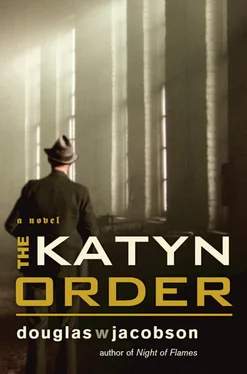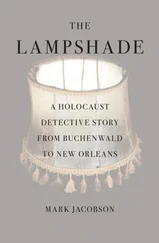Adam shook his head. “No, I was desk-bound in London. Working with SOE.”
“Lousy job, that is. I’d take on the bloody Krauts on those beaches again instead of this gig if I had my way. Hate these damn spooks, I do. And hobnobbing with the fuckin’ Russians? No good will come of that, mind you.”
Adam smiled. “So, how’d you wind up here, working for Whitehall?”
“Whitehall?” The driver snorted. “That ol’ fart don’t ever talk to the likes of me. I don’t work for him; no way I’d want that. I just drive his car and listen to the load of crap he dishes out to whoever’s ridin’ with him. That’s all they think I’m good for after taking a load of shrapnel in the knee at Antwerp.”
Adam thought he’d noticed a limp when the corporal walked around the car. “That’s the top brass for you,” he said, “playing their own little chess game. They don’t care who gets caught in the crossfire.”
The corporal nodded again, and they drove in companionable silence the rest of the way through Grunewald, the “mansion colony” developed by Otto von Bismarck in the late nineteenth century for Berlin’s elite. The winding roads led them through a largely undamaged, heavily wooded area populated with vast estates and hunting lodges situated along streams and small lakes. The peaceful serenity, less than an hour’s drive from the shattered ruins of central Berlin, was almost impossible for Adam to comprehend, though he found some satisfaction in the overgrown lawns and shuttered windows of the mostly vacant estates. If it were up to him, he’d burn down the whole damn country.
They turned off the road, and the corporal parked the Mercedes in the center of a broad circular drive. Adam stepped out and stared in awe at the massive, three-story stone structure towering above him. A pair of granite lions flanked broad marble steps that led up to a slate terrace at least ten meters wide. At the top of the steps and across the terrace was the main entrance—double oak doors, five meters high, framed by granite pillars encircled with serpents.
One of the doors creaked open as Adam approached, and a butler appeared, a tall, regal-looking man wearing a pince-nez and a black tuxedo. The butler bowed slightly with a curt, “Guten tag, Herr Nowak,” and motioned for him to enter.
Adam was shown into a richly paneled and elegantly furnished drawing room lined on one side by floor-to-ceiling leaded glass windows overlooking the terrace. Stanley Whitehall hoisted his rotund body off a leather chair and lumbered across the room, holding a whiskey glass in one hand.
“Good to see you again, old chap,” Whitehall said. “Care for a drink?” He held up the glass. “Glenlivet, from Scotland.”
Adam barely heard him as his attention was drawn to the presence of another person in the room. A large, broad-shouldered man in a Russian Army uniform stood with his back to him, pouring a drink at a sideboard.
General Andrei Kovalenko turned around and said, “Good evening, Mr. Nowak.”
Adam stiffened, then glanced back and forth from Kovalenko to Whitehall, dumbfounded.
The Russian general stepped up to him and held out a glass. “Have a drink, Mr. Nowak. Stanley will explain it to you. Captain Andreyev will be arriving any moment, and he and I must have a little chat. Then I’ll find out what the cook is preparing for dinner. I understand the former owner of this mausoleum used to throw parties for Hermann Goering.”
Kovalenko closed the door behind him, and Whitehall gestured to the leather chairs on either side of the fireplace.
Adam eyed him suspiciously and then sat down.
“Andrei uses this house for certain meetings that are better held outside of the Russian sector,” Whitehall said. “He and I go way back. I met him in school in London in 1910. His mother brought him there after his father was killed in the Russo-Japanese War. She was Polish.”
Adam almost spilled his drink. “Kovalenko’s mother was Polish?”
Whitehall nodded. “Born in Warsaw, daughter of some nobleman. His father was a Russian Army officer, who was stationed there. In ’04 his father left for Manchuria and never returned. His mother moved the family to London a few years later. Apparently she had traveled there when she was growing up and had connections.”
Adam took a long swallow of the whiskey, allowing the mellow liquor to slide down his throat. He set the glass on a side table. “So, you knew that I met Kovalenko during the Warsaw Rising?”
“Of course.”
“But I was under cover!” Adam exclaimed, his voice rising. “Even Colonel Stag didn’t know who I was. Christ Almighty, did Kovalenko know—?”
Whitehall held up his hand, interrupting him. “Kovalenko remembered meeting a certain American, an envoy representing the Polish Government, who came across the river for a secret meeting. He didn’t know who you were at the time, of course. I filled in the blanks for him after the fact. Apparently he was impressed with how you held your ground with one of his officers.”
“Then my meeting Kovalenko again here in Berlin was not just a coincidence.”
“A minor deception. But necessary.”
“Necessary? Jesus Christ!” Adam got to his feet and paced around the elegant room. He stopped and turned back to the pudgy, sly man with whom nothing was ever as it seemed. “Are you going to tell me what the hell’s going on?”
Whitehall nodded. “Of course, that’s why you’re here. Care to sit back down?”
Adam glared at him, then sat down.
“When Kovalenko’s mother died, he went back to Russia and joined the army, though he’s always been somewhat conflicted, given his Polish heritage. At any rate, he advanced through the Red Army officer corps until Stalin’s purge in ’37, when he was fingered by the NKVD for having connections with foreign intelligence.”
“Because of his mother being Polish and her associations in London?”
“Probably. That’s how things work in Russia.”
“Let me guess: he was exiled.”
“To Siberia, along with several hundred other officers… those they didn’t execute. For good measure, they also arrested his wife and threw her into Lubyanka prison. Then, when the Germans invaded Russia in ’41, the Red Army needed officers and he was reinstated. But, to keep him in line, his wife remained in prison—where she died a year later. He’s never gotten over it. His hatred of Stalin, Beria and the NKVD is very deeply rooted.” Whitehall stood up and plodded over to the sideboard. He refilled his glass and returned with the bottle, setting it on the table next to Adam. “Do you remember the night you and I had dinner in London?”
Adam refilled his own glass. “Yes.”
“You made a comment that night… about the Russians murdering thousands of Polish officers in 1940.”
“The Katyn Forest massacre; you didn’t believe it.”
Whitehall sat back in the soft leather chair, balancing his drink on the arm. “Another deception, I’m afraid. I most certainly do believe it. What’s more important, Kovalenko believes it. He’s convinced it was all conceived and carried out by the NKVD, and he’s been working behind the scenes to help us find proof.”
“What makes you think Kovalenko can be trusted? The son of a bitch lied to me about coming to the aid of the AK. Then he and his men sat there on the other side of the river while Warsaw was burned to the ground.”
“Yes, he can be trusted. Can you imagine how an atrocity like Katyn must have affected him? He’s part Polish, and to have his countrymen commit a crime of that magnitude?”
“Goddamn it, Stanley! If he’s part Polish, how could he watch Warsaw burn? How could he let hundreds of thousands of innocent civilians—”
Читать дальше












